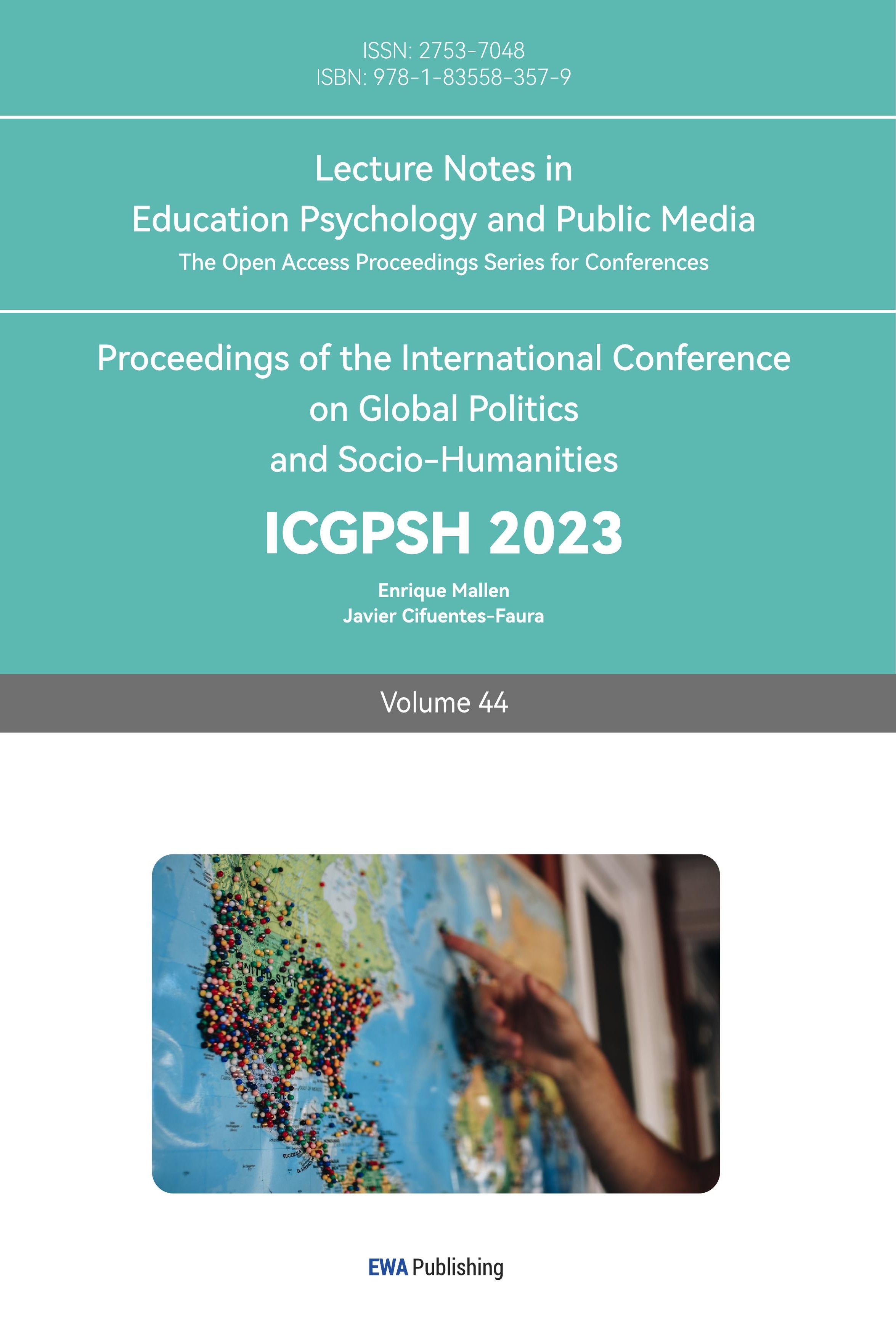References
[1]. Cheng, H., & Zhang, L. (2017). Confucianism and conservatism: A Chinese perspective on the societal acceptance of homosexuality. Psychology & Sexuality, 8(4), 285-297.
[2]. Liang, J., Li, G., & Xiao, Y. (2018). Mental health status and influencing factors among LGBT individuals in China. Journal of Affective Disorders, 240, 65-70.
[3]. Li, Y., Yuan, Z., Clements-Nolle, K., & Yang, W. (2018). Sexual Orientation and Depressive Symptoms Among High School Students in Jiangxi Province. Asia-Pacific Journal of public health, 30(7), 635–643.
[4]. Chen, S., Zhang, W., Wang, L., & Fan, J. (2017). Discrimination, family rejection, and depression among Chinese sexual and gender minority adolescents. LGBT Health, 4(4), 283-288.
[5]. Miles-Johnson, T., & Wang, Y. (2018). 'Hidden identities': Perceptions of sexual identity in Beijing. The British Journal of Sociology, 69(2), 323–351.
[6]. Liu, J. X., & Choi, K. (2006). Experiences of social discrimination among men who have sex with men in Shanghai, China. AIDS and behavior, 10(4 Suppl), S25–S33.
[7]. Ryan, C., Huebner, D., Diaz, R. M., & Sanchez, J. (2009). Family rejection as a predictor of adverse health outcomes in white and Latino lesbian, gay, and bisexual young adults. Pediatrics, 123(1), 346-352.
[8]. Ma, Q., Dou, D., Gao, Y., & Zhang, Y. (2017). A systematic review of mental health and well-being of sexual minority youth in China. Journal of LGBT Youth, 14(4), 362-379.
[9]. Wei, M., Kuang, Y., Russell, S. T., & Zhao, J. (2021). Chinese LGBT-affirmative psychologists: Professional experiences, expertise, and attitudes. Psychology of Sexual Orientation and Gender Diversity, 8(1), 1-11.
[10]. Chou, W. S. (2016). Same-sex marriage and the assimilationist dilemma: A research agenda on marriage equality and the future of LGBTQ law, policy, and advocacy. Law & Inequality: A Journal of Theory and Practice, 34, 267.
Cite this article
Liu,J. (2024). China's Conservatism and Its Impact on LGBT+ Teenagers. Lecture Notes in Education Psychology and Public Media,44,1-6.
Data availability
The datasets used and/or analyzed during the current study will be available from the authors upon reasonable request.
Disclaimer/Publisher's Note
The statements, opinions and data contained in all publications are solely those of the individual author(s) and contributor(s) and not of EWA Publishing and/or the editor(s). EWA Publishing and/or the editor(s) disclaim responsibility for any injury to people or property resulting from any ideas, methods, instructions or products referred to in the content.
About volume
Volume title: Proceedings of the International Conference on Global Politics and Socio-Humanities
© 2024 by the author(s). Licensee EWA Publishing, Oxford, UK. This article is an open access article distributed under the terms and
conditions of the Creative Commons Attribution (CC BY) license. Authors who
publish this series agree to the following terms:
1. Authors retain copyright and grant the series right of first publication with the work simultaneously licensed under a Creative Commons
Attribution License that allows others to share the work with an acknowledgment of the work's authorship and initial publication in this
series.
2. Authors are able to enter into separate, additional contractual arrangements for the non-exclusive distribution of the series's published
version of the work (e.g., post it to an institutional repository or publish it in a book), with an acknowledgment of its initial
publication in this series.
3. Authors are permitted and encouraged to post their work online (e.g., in institutional repositories or on their website) prior to and
during the submission process, as it can lead to productive exchanges, as well as earlier and greater citation of published work (See
Open access policy for details).
References
[1]. Cheng, H., & Zhang, L. (2017). Confucianism and conservatism: A Chinese perspective on the societal acceptance of homosexuality. Psychology & Sexuality, 8(4), 285-297.
[2]. Liang, J., Li, G., & Xiao, Y. (2018). Mental health status and influencing factors among LGBT individuals in China. Journal of Affective Disorders, 240, 65-70.
[3]. Li, Y., Yuan, Z., Clements-Nolle, K., & Yang, W. (2018). Sexual Orientation and Depressive Symptoms Among High School Students in Jiangxi Province. Asia-Pacific Journal of public health, 30(7), 635–643.
[4]. Chen, S., Zhang, W., Wang, L., & Fan, J. (2017). Discrimination, family rejection, and depression among Chinese sexual and gender minority adolescents. LGBT Health, 4(4), 283-288.
[5]. Miles-Johnson, T., & Wang, Y. (2018). 'Hidden identities': Perceptions of sexual identity in Beijing. The British Journal of Sociology, 69(2), 323–351.
[6]. Liu, J. X., & Choi, K. (2006). Experiences of social discrimination among men who have sex with men in Shanghai, China. AIDS and behavior, 10(4 Suppl), S25–S33.
[7]. Ryan, C., Huebner, D., Diaz, R. M., & Sanchez, J. (2009). Family rejection as a predictor of adverse health outcomes in white and Latino lesbian, gay, and bisexual young adults. Pediatrics, 123(1), 346-352.
[8]. Ma, Q., Dou, D., Gao, Y., & Zhang, Y. (2017). A systematic review of mental health and well-being of sexual minority youth in China. Journal of LGBT Youth, 14(4), 362-379.
[9]. Wei, M., Kuang, Y., Russell, S. T., & Zhao, J. (2021). Chinese LGBT-affirmative psychologists: Professional experiences, expertise, and attitudes. Psychology of Sexual Orientation and Gender Diversity, 8(1), 1-11.
[10]. Chou, W. S. (2016). Same-sex marriage and the assimilationist dilemma: A research agenda on marriage equality and the future of LGBTQ law, policy, and advocacy. Law & Inequality: A Journal of Theory and Practice, 34, 267.









